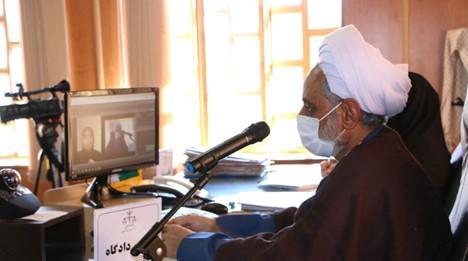The Islamic Republic of Iran is increasingly holding online trials for demonstrators arrested during the ongoing nationwide protests, according to a group that tracks detentions in the country, raising concern over the defendants’ rights in the absence of an independent judicial system.
Online trials have been held in Iran since the peak of the coronavirus pandemic in November 2020.
With the arrest of at least 18,000 people since the beginning of the protest movement triggered by the September death of 22-year-old Mahsa Amini in the custody of morality police, such proceedings have allowed the authorities to unjustly sentence protesting men, women and children within minutes on charges that can carry a death sentence.
Courts in Iran, particularly Revolutionary Courts, often fall far short of providing fair trials and use confessions obtained under torture as evidence. Authorities usually fail to investigate the numerous allegations of torture and routinely restrict detainees’ access to legal counsel.
"The existence of such courts during the pandemic was due to the lack of necessary conditions to prevent the spread of the virus in prisons. But today, especially with the arrest of thousands of protesters and the possibility of serious punishment, such courts are worrying," Roya Broumand, a U.S.-based Iranian human rights activist and co-founder of the Abdul Rahman Broumand Foundation, tells IranWire.
"Online courts allow the defendants to be tried more quickly. This process saves money and time for the judiciary, but it reduces the possibility of a minimal defense, even less than in the normal in-person situation," Broumand says, expressing concern over “the wider violation of the [defendants’] right to access to a lawyer.”
In a recent report, the Committee for Follow-up on the Situation of Detainees cites the case of Ali (Makan) Davari, a 19-year-old protester arrested in the northern city of Langrod. Davari was tried remotely and sentenced to death on December 24 on charges including "waging war against God" and "membership in a group to disrupt national security."
On November 10, the Karaj Revolutionary Court sentenced Amir Mohammad Jalali, a citizen of Karaj, to three years in prison and two years of exile in the city of Kerman. According to human rights activists, the trial lasted three minutes and Jalali had 30 seconds to defend himself.
According to Hossein Raisi, a lawyer in Canada who provides legal counsel to the families of detained protesters, "an online court in itself is not bad or good.”
“What’s important is the mechanism and principles under which the hearings are being held, which unfortunately in both cases deprive the defendants of a fair trial," he tells IranWire.
"In general, the judicial system of the Islamic Republic is in a position where it does not want to meet the standards of a fair trial. Online hearings increase the speed of proceedings, and because they want to apply repression as quickly as possible, they have created this procedure.”
visit the accountability section
In this section of Iran Wire, you can contact the officials and launch your campaign for various problems


























comments